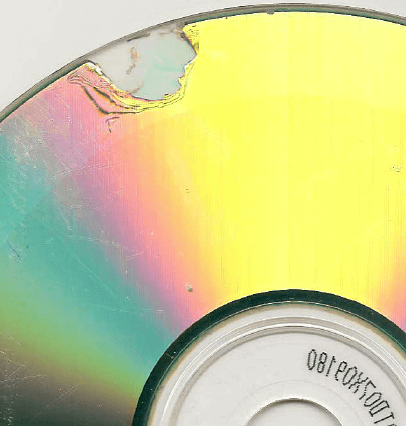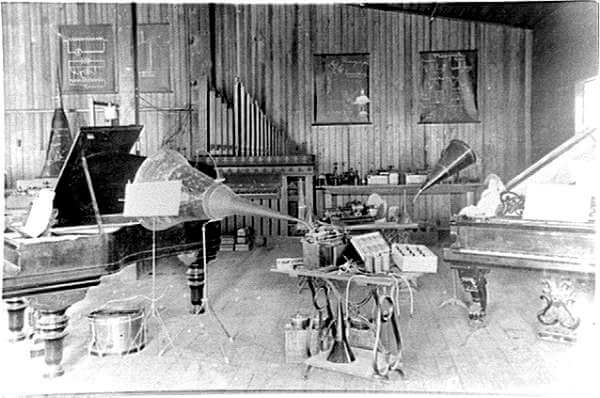Ricochet is the best place on the internet to discuss the issues of the day, either through commenting on posts or writing your own for our active and dynamic community in a fully moderated environment. In addition, the Ricochet Audio Network offers over 50 original podcasts with new episodes released every day.
 A Good Shellacking
A Good Shellacking
 On April Fool’s Day of 2003, the folks at NPR’s All Things Considered and the Library of Congress teamed up for an epic prank. They announced that the LOC was in the process of transferring its entire music collection to 78rpm records.
On April Fool’s Day of 2003, the folks at NPR’s All Things Considered and the Library of Congress teamed up for an epic prank. They announced that the LOC was in the process of transferring its entire music collection to 78rpm records.
“The whole history of recorded sound has been a case of one technology leapfrogging over a previous one,” (explains reporter Rick) Karr. “But in the last few decades, the changes from vinyl to tape cassette to CD to MP3 have shortened the life span of most music collections. “But thanks to a grant from the Smolian-Giovannoni Foundation, all of these audio formats are being transferred onto 10-inch wide, 78 rpm shellac disks — the one rock-solid format archivists have identified that works every time.”
Even today the story, still found in NPR’s online archive, gets an occasional, “Can this be real?” inquiry.
For humor to work there has to be an element of truth in it. And the truth here is that nobody really knows how long digital media will last. Anything that interrupts the flow of zeros and ones will make media unusable, whether that results from stray magnetic fields on hard drives or the physical failure of digital tape or optical storage devices like CDs and DVDs.
In the days of analog television, a small crease or edge damage to video tape meant a momentary breakup or skew at the bottom of the picture. For digital tape, the exact same damage can result in unrecoverable loss.
If all of your photographic and video memories of the last 10 years live on a hard drive or CD-Rs, will you still be able to access them in another 10, 20 or 30 years?
As for the Library of Congress, they take their mission to preserve the nation’s cultural heritage seriously. Their Motion Picture, Broadcasting & Recorded Sound Division is dedicated to saving all manner of media. To this end, they request almost $87 million from Congress to run their state-of-the-art facility in Culpepper, Virginia. It does everything an American citizen would want their government to do — except provide access to the people who pay for it.
Most of the Library’s collection is for research appointments only. Professional transfers are only available to those who seek out original copyright holders and come bearing all the appropriate legal permissions. All of which poses the question: “If you remove a country’s culture from the people and keep it locked away in a vault, are you really preserving it?” How can you add these things to the collective memory of future generations if they’re never exposed to it?
One of their few online offerings is The National Jukebox, which contains their collection of Victor recordings from 1901 to 1925. This browsable database contains some 10,000 recordings, like this snippet of Al Jolson singing an early Irving Berlin hit, I’ve Got My Captain Working For Me Now:
Not exactly something you’d put on the stereo and crank up.
 For almost the first 50 years, all audio was recorded and played back the same way – through the brute force of sound waves vibrating on a diaphragm placed at the bottom of an enormous brass horn. That technique both etched the sound onto the surface of the recording medium and reversed the process when played back.
For almost the first 50 years, all audio was recorded and played back the same way – through the brute force of sound waves vibrating on a diaphragm placed at the bottom of an enormous brass horn. That technique both etched the sound onto the surface of the recording medium and reversed the process when played back.
The frequency range was very limited. If you wanted to be a hit on records you had better be LOUD. Brass band loud. Opera singer loud. Al Jolson loud.
The years after the First World War would see dramatic developments in microphones, radio and amplification. In 1925, Western Electric (which would soon become part of the Bell System Laboratories) introduced the electronically amplified, electromagnetic disc cutter. Waiting around the corner was a new type of singer, the crooner, a baritone with a relaxed and easy delivery that was way more intimate and attuned to the mic.
It’s not a coincidence that the cutoff date of what’s available ends with the introduction of electrical recording. Everything after that remains the property of boomer children and corporations determined to squeeze every last drop of commercial viability from the creativity of prior generations.
Published in Culture, Entertainment, General



I know, I know. I’m just not a big fan of the whole “sure, you invented it, but you’ve had your run and now it belongs to everyone else. Sorry!” I have an instinctive revulsion to taking things away from some for the Greater Good of Everyone Else, if only because admitting that point provides intellectual justification for all sorts of state-directed confiscation and redistribution. If they get around to the latter. They’re usually so giddy with delight over the confiscation part they don’t bother with the rest.
The progress of useful arts is not impeded by allowing an author to be the sole beneficiary of their work as long as they’re drawing breath.
James,
Don’t completely disagree with you. But that’s not the way the law currently stands. Would you be okay with changing copyright so that the copyright ends with the death of the author and doesn’t pass to their family? That would certainly simplify the search for rights-holders to old material. Show the author is dead, and boom, it’s public domain.
Now what do we do about Corporate copyrights (Disney)?
Or you could have the life of the author or 30-40 years, whichever is longer. Someone might spend years researching a book, write it, publish it, then croak. Their family would be able to get royalties for quite some time before the copyright expires. But life of the author plus 70 years, which is what we have now, is too much.
Gentlemen,
What if we leave the copyright term as is. However, we make a public domain clause in the law after a certain number of years that allows the government to place the work on-line for a low standard viewing access fee for which 50% goes to the copyright holder and 50% goes for maintenance costs. Like on Amazon a few preview pages would be visible without fee. Any further access or publication beyond the standard viewing would still be only with the copyright holders consent.
Regards,
Jim
Why do we need to do anything about Disney? Because they can make money from their copyrighted works, they do an outstanding job of curating, preserving, packaging, and distributing them. I honestly don’t have a problem with that.
Consider the famous example of It’s A Wonderful Life. This film fell into the public domain because of a clerical error, which admittedly did help to make it famous (because it was cheap to show on TV). But it also meant that there was a proliferation of poor-quality versions. Eventually the previous copyright owner was able to reassert its copyright and regain control of the movie, ensuring that it’s presented in an authoritative form.
This is partly a devil’s-advocate argument on my part. I actually agree that the perpetual-copyright model is broken, and corporate copyright (where “lifetime of the author” becomes meaningless) can be problematic. But it can also be beneficial, in cases where a property is actually worth taking care of, and a corporate owner can be relied on to do a better job than someone who has no stake.
Try to get hold of a copy of “song of the south” recently?
Nobody wants Mickey Mouse to lapse into public domain. Imagine the bad things that could bring.
Disney probably has probably only one property that they’ve locked away, namely Song of the South.
There are dozens of gifted writers and entertainers who are now consigned to obscurity. In fact, James and I could probably trade names for an hour (or more) before another Ricochetti would recognize someone.
?
I want Mickey in the public domain. Imagine the wonderful things that could bring.
Wonderful things… Like Disney porn?
I figured that would come up. I didn’t assert that Disney is perfect, only that (all things considered) they do a better job than someone with no financial interest would do. Keeping Song Of The South off the market is part of Disney’s overall strategy for maximizing the value of their brand and, therefore, their intellectual property. I’m not convinced they’re wrong about that.
The argument “I don’t like the way you’re managing your property, so we’re going to take it away from you” is not a road we should go down, in my opinion.
(And I feel sure that, if I really wanted to get hold of a copy of Song Of The South, I could probably do so by the end of the day. Not legally, I grant.)
Not to say too much, but it already exists. People coined rule 34 for a reason, and it’s not because the smut peddlers on the internet shy away from ruining your childhood.
Hank – No, but they can’t openly market the stuff.
To an extent. We’re also talking about derivative works. You can say that people ought to just come up with their own material whole cloth, but that’s not really how creativity works.
…oh, and I’d rather do a straight up 50 years than “life of the author.” More certainty, and one less thing to check.
At the risk of bringing in the estate tax thread, I can see where someone would want to bequeath the rights to a body of work to the heirs. As a business. And while I’m with EJ on what people would do to Mickey – the quantity of obscene T-shirts would be beyond numbering, because that would be so edgy; nothing says artistic sophistication like whizzing on the emblems of innocence – that would presume that copyright law should be required to prevent people from doing Bad Things, and that’s a subjective thicket from which no one would emerge unbloodied.
Maybe Disney could learn from Paramount, which has apparently decided to turn a blind eye to all the Star Trek fan films. We’re not talking amateurish hilarities with cardboard sets – in some respects, the sophistication of some of these efforts exceeds the original product. Paramount figures it keeps the brand going, I guess, and for all I know puts the hammer down if anyone does something acceptable.
Yep.
Actually, I was told that it was still available in one or two of the Scandinavian countries within the last ten years or so. I don’t know if it still is, though.